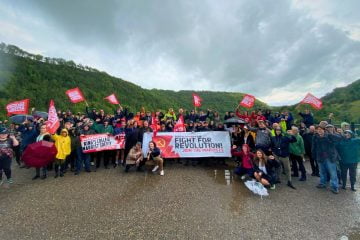Things have been getting worse. Students are being saddled with debt and their mental health is deteriorating as a result. At the same time, the NHS is being bled dry and can no longer take care of an ailing population. It seems the only jobs available for young people are on zero-hour contracts or consist of casualized employment for companies like Uber and Deliveroo. The rich are leading the world to ruin, while stashing their wealth in tax havens. Everyone knows this. Some more consciously than others, but there is an inescapable mood in society: things are getting worse, and this will only continue.
But it doesn’t have to be this way. I study physics. I’m very content with the choice I made; every day I learn something fascinating or unexpected. But the most important lesson physics has taught me is that we aren’t slaves to nature. Perhaps the most fundamental law of nature we have ever discovered is that, on a cosmic scale, things become more disordered as time goes on. But long ago we learned that, if we understood exactly how and why nature worked, we, as conscious beings, could impose our will on it, and conjure order out of chaos. Nature didn’t want you to have antibiotics, or communicate across continental divides, or even enjoy a cold ice cream on hot summer days, but here we are, doing all these things. The history of mankind comes down to our discovery of new ways to shape the world we were given. By understanding the world around us, we can make our own destiny.
Things can get better. In the final analysis, a society’s standard of living is determined by how much it can produce for each of its members. And for the last 300 years, our productive capacity has been growing and growing. As a society, we are wealthier than at any point in history, and yet most of us are becoming more destitute by the day. This is the absurd impasse in which capitalism finds itself. While the government – part of the capitalist state – claims there simply isn’t the money to give everyone the dignified life they need and deserve, the capitalists hoard billions in their private bank accounts, sitting idle as uninvested capital. Those who claim that capitalism is the best system must reckon with this contradiction.
Things will get better. Marx, 200 years ago, described the laws of human development, and Marxism empowers us to finally take full control of our destiny. Mankind has come a long way from the caves where it started out. There is no reason that our species, having built a better world by understanding and conquering nature, should stop short of constructing the society worthy of us. We can have a world where our needs are taken care of without toil, where we cooperate to put the magnificent achievements of technology to the use for the benefit of all, and where we are free to become the best version of ourselves.
I come from a very privileged background. The 2008 financial crisis was to me a phenomenon I observed with curious interest, not a life-changing cataclysm I would have to contend with. Nevertheless, I came out of it somewhat politicized. I was 12 at the time, and it was to be two more years before I first read the Communist Manifesto, without understanding very much. At any rate, Marxism was just a theory, without very much impact on my life.
That is, until I came to London. Here, the contradictions of capitalism are heightened to a painful extent: vacant luxury flats in the centre with the homeless sleeping on their doorsteps; the bankers who make their living out of robbing working people alongside the gig economy workers who deliver their fancy lunches; the glistening towers of big news corporations only a few hundred metres from the real world they ignore in the media. In short, I started to understand how the theories of Marx and Engels explained a painful reality. But reading the works of these and other great thinkers and Marxists throughout the centuries, I began also to understand the beauty, the freedom, and the possibilities of another world that was within our grasp.
Marxism promises us a world where life is fair and fulfilling, not the drudgery capitalism makes it. It promises a world where mankind is at peace with itself and the world it has made, a world free of want and destitution. All that is required is that we seize the means of production, so that we can rationally plan the economy to satisfy the needs of all, and not the profits of a few. We have a world to win, and what a world it is.
by Anthony Oakland, KCL Marxists



